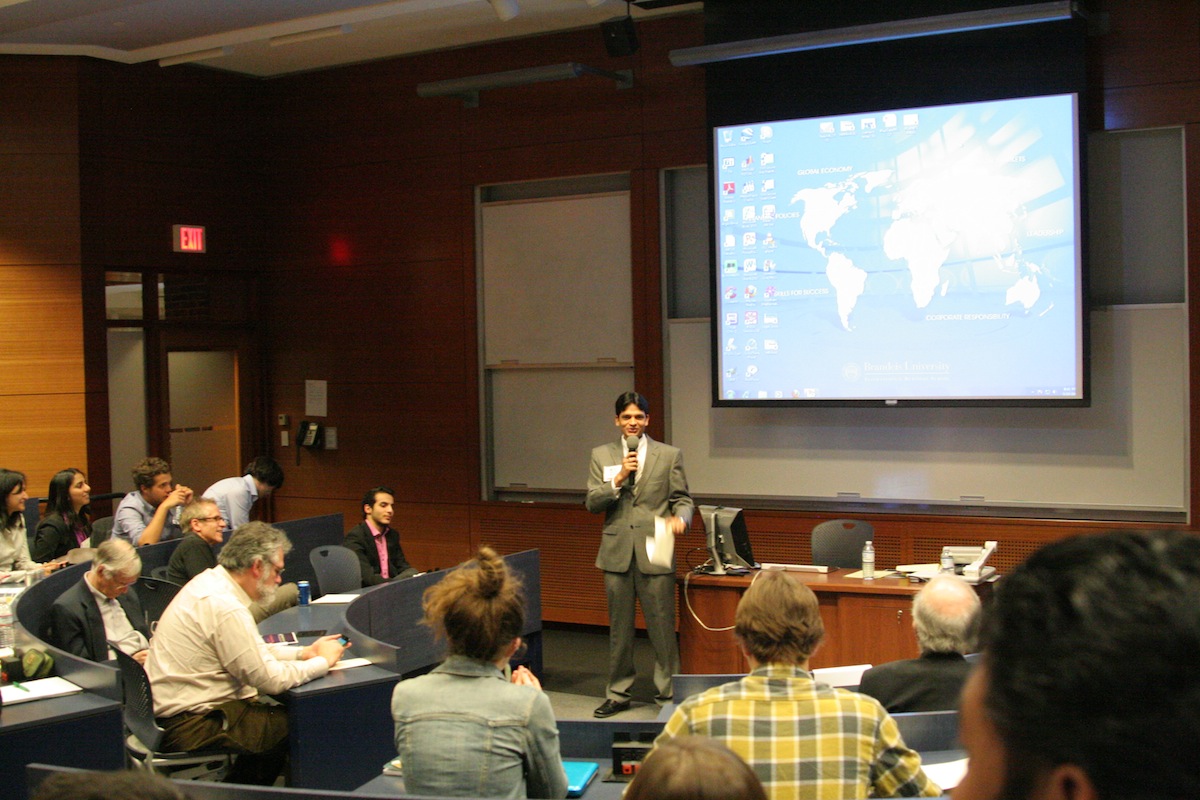At Brandeis, Students Learn to Build a Startup in Three Days

Photo via Brandeis International Business School
What exactly does it take to create a conceptual tech startup or software company? At Brandeis University, it means spending 60 hours locked in a room on campus until something worth pitching is born.
From April 4 to April 6, the Brandeis International Business School will host the annual “3-Day Startup Challenge,” a competition where students will hunker down inside the classroom and be tasked with teaming up with random partners to hatch a plausible business plan, all while working against the clock.
“This is turning the business school into a pressure cooker for entrepreneurial ideas,” said professor Ben Gomes-Casseres, who teaches international business at Brandeis and is one of several mentors who oversee the three-day hackathon. “They work around the clock, and we bring them food, but I don’t know if they even get a chance to shower.”
Students (roughly 40 have signed up for this year’s 3DS event) gather together on Friday, introduce themselves to one another and seek out common goals and startup desires, and by Saturday they’re off and running. Once the teams have formulated and the brainstorming is well underway, students are expected to develop a functioning product prototype and business model—based on piloting and research—that they can then present to a panel of professionals from the business sector on Sunday.
Judges of this year’s competition include Joanna Meiseles, senior director of programs and operations at MassChallege Inc., Jane Ives, director at Grameen Bank, Kyle Alspach, reporter for BetaBoston, and Dan Bergstresser, associate professor at Brandeis IBS.
Gomes-Casseres said there’s little sleep matched with lots of motivation involved in order to bring an idea from a conversation between a group of students to a semi-functioning startup with the potential to get scooped up by investors. “The purpose here is the experience, how you put together the teams, and how you get the most out of people’s ideas and get them on the fast track,” he said. “It’s less about the business competition and more about that experience.”
Students will get free advice about their pitched product from professionals with experience in marketing, strategy, and others who have been on the finance side of startups as the projects advance through the weekend.
The tight deadlines and time constraints put pressure on the sleep-deprived students in a way that forces them to work in unison and develop critical business and entrepreneurial skills. “I think it encourages focus, and the deadline and the fact that you have to keep moving helps you create these milestones,” said Gomes-Casseres. “It leads to the whole entrepreneurial idea of a fast fail or a fast success. You don’t want to spend a year pursuing something and then find out that it fails. Part of entrepreneurship is learning to do something that trains the brain muscle and the social muscle of working in a team and getting the team up to speed.”
Prior 3DS challenges have led to successful endeavors for some students, too. “I know some have gone onto the MassChallenge process, so they continue to see if they can be launched, and I believe some have led to businesses that the students are running and doing themselves,” said Gomes-Casseres. “But this is very much a sped up process. We go around studying and preparing for mid-terms and finals, but it takes months before the course gets to a conclusion. In the real world, the entrepreneurial world, it’s very fast moving and to learn and see how it works so quickly, and learn about the allocation of jobs and picking a leader, this process is helpful—you have to see it to believe it.”
Final presentations of the ideas born out of the mini-incubator will be open to the public, and will begin at 7 p.m. on Sunday, April 6.


